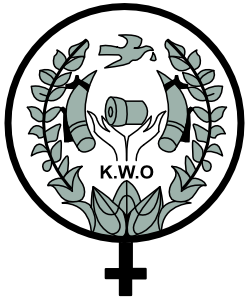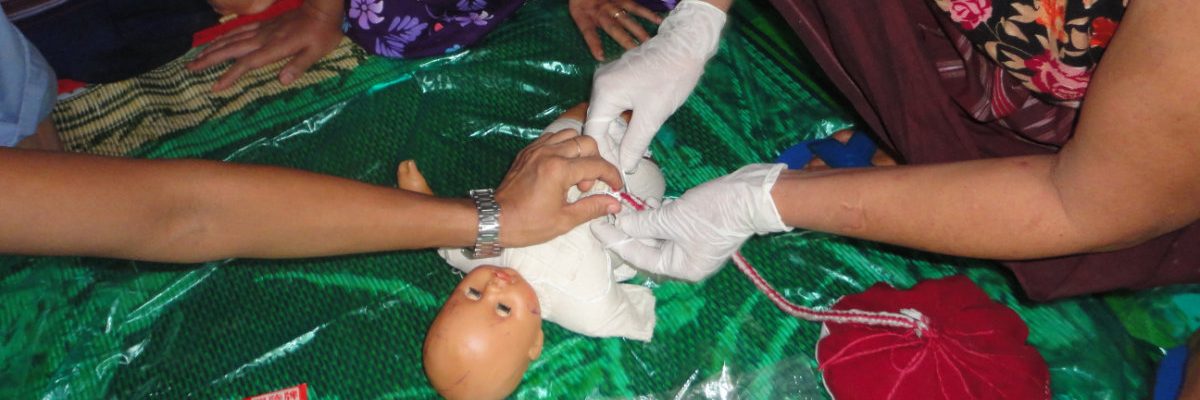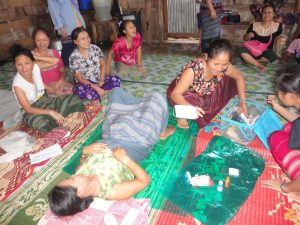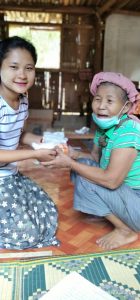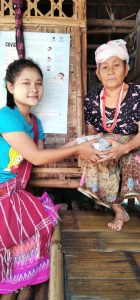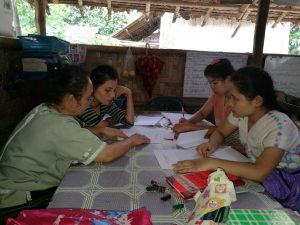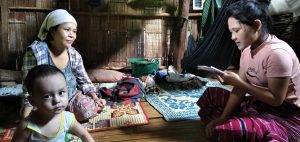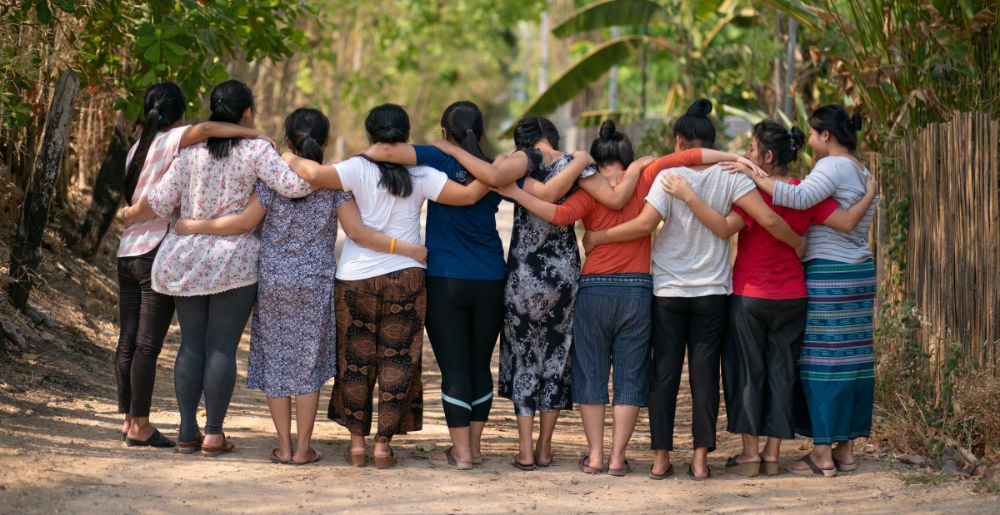KWO believes everyone, especially women, should have access to safe and dignified health services. And that we all should be included in the design of the healthcare system. The health services in Karen State are very limited due to the many years of Burmese military attacks on the ethnic peoples. In most places there are no clinics or medics. About 80% of women give birth at home, and if possible, with assistance from a Traditional Birth Attendant (TBA) who lives in the community. A lot of the TBAs have received training from one of the Karen or exiled Health agencies (BPHWT, or BMA, or KDHW). If it’s a normal delivery, it may go well, but if there are complications, there can be very poor outcomes for the mother and baby.
In the refugee camps, where daily life is safer, the health services are more established and there are medics, clinics and programs to support women’s reproductive health needs. In most of the refugee camps, Traditional Birth Attendants also assist women to give birth. However there are many gaps in the health services for refugees, and a lot of room for improvement. The health systems in the refugee camps are funded and implemented by international health agencies. All the camp-based staff, medics and healthworkers are refugee men and women. In recent years, the health agencies have made even further cuts to their services: less referrals of serious patients from camps to Thai hospitals for treatment, less training to the camp health workers, less medicines and supplies to the clinics.
1. Project Goal
To respond to gaps in services for Karen refugee women’s reproductive health needs and strengthen the capacity of KWO’s women’s health program.
2. Location
We implement this project in 2 Karen-majority Refugee Camps on the Thai-Burma border in Mae Hong Son Province: Mae Ra Ma Luang and Mae La Oon.
3. Overview
KWO established this project in the two most northern Karen refugee camps in 2005. We have been providing training and material support for practicing Traditional Birth Attendants (TBAs) since then. Many refugee women prefer to give birth in their own homes, even if there is are clinics in the camps. Women call on local TBAs to assist them throughout their pregnancy, the delivery of baby and to support them also in the first weeks after baby is born. The TBAs have a wealth of knowledge and experience and are highly respected. Community TBAs do not receive stipends at all from any organisation, although they should. Some families, if they are able, offer the TBA a gift in recognition of her services.
Under this project, KWO ensures that practicing TBAs receive reliable and adequate supplies of hygiene items so that the delivery of baby is safe for baby, for mother and for the TBA. Hygiene items distributed to TBAs include single-use “maternity kits” for each delivery (a sterile, disposable blade with handle, gloves, mask, gauze, thread, umbilical clip, cotton wool, plastic sheet) and other multi-use items including nail clippers, soap, Povidone antiseptic, spirit alcohol, torch and batteries. If requested, the TBAs also assist women with deliveries which take place in the clinics. Any pregnant woman who is assessed as “high risk” is encouraged by all healthworkers, including the TBAs, to give birth in the clinic in case of complications.
To strengthen skills and knowledge of the TBAs and ensure safety for all, KWO organises training each year for all practicing TBAs and any new TBAs who arrive in the camps, or for young women wanting to take on this satisfying community role. Most TBAs are women, but there are a couple of men as well. KWO has created many training materials, including a “TBA Training Manual”, the first in the Karen language. We collaborated with Mae Tao Clinic (MTC) and Burma Medical Association (BMA) both based in Mae Sot, Thailand, in the creation of our manual and for some of our training sessions. KWO is not a medical health service provider. We are a community-based health promoter and we advocate for better health services and better access for all.
Under this project we also conduct community education sessions about Women’s Health with a focus on maternal health, nutrition for pregnant and post-natal women, and malnutrition in children. Our goal is to improve understanding of health and to prevent common health problems in the community.
4. Beneficiaries and Participants
In the 2023 project year:
- 57 Traditional Birth Attendants in the 2 refugee camps benefitted from safer and more comfortable working conditions, and refresher training.
- 815 women received assistance for a safe delivery of new born baby in homes and in the clinics in the 2 camps.
5. Main Activities
The main activities conducted under this project:
- Purchase, pack and distribute reliable supplies of hygiene items for safe births in homes and clinics.
- Support to Traditional Birth Attendants (TBAs) to assist in safe, dignified home births and deliveries in clinics.
- A team of KWO leaders and the senior TBAs conduct Women’s Health Awareness sessions. Usually in small groups or in home visits.
- Conduct an Annual Fellowship event in each camp to express appreciation of the community for the work of TBAs.
- We conduct a Training of Trainers (ToT) every few years, and on-going training for practicing TBAs and new TBAs each year.
- Print and distribute the “KWO TBA Training Manual” and other health learning and teaching materials.
- Maintain records of all practicing TBAs, assisted births, and distribution of hygiene supplies.
- TBAs identify child protection cases of concern and report to KWO for family assistance.
6. Who does the work?
There is one full-time project staff who manages this project, with close collaboration of the KWO Central Executive Committee. The KWO Health Program Co-ordinators in the 2 refugee camps support the TBAs in implementation of the project.
7. The Impact
TBA-assisted births, in homes or in clinics, are more hygienic, safer for all, and more dignified for women.
Understanding of fundamental elements of women’s health, maternal health, and children’s health has increased in the broad community. This has led to behavior changes among men and women and children which prevent common health problems.
Respect for Traditional Birth Attendants in the Karen culture is maintained, and the knowledge and capacity of Traditional Birth Attendants is safeguarded.
Community confidence and participation in monitoring and evaluation of refugee health systems has increased.
